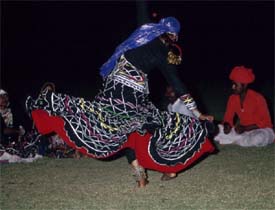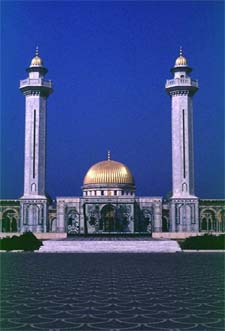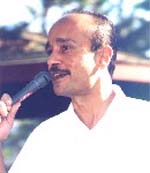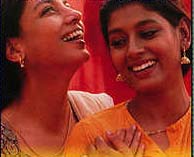
|
Interview by Randolfe Wicker
 Randolfe Wicker: I wonder, Raj, what gay life is like over there in India? Ashok Row Kavi told me that every Indian is available. I wonder if there's a lot of role-playing? Guilt? What are attitudes toward someone being a bit overweight? Is the "cult of youth" entrenched there or are they more relaxed about the age issue?
Randolfe Wicker: I wonder, Raj, what gay life is like over there in India? Ashok Row Kavi told me that every Indian is available. I wonder if there's a lot of role-playing? Guilt? What are attitudes toward someone being a bit overweight? Is the "cult of youth" entrenched there or are they more relaxed about the age issue?
Raj Ayyar: That's a whole bunch of questions rolled into one! I don't know that I agree with Ashok's flip statement. I think an awful lot of Indian men, living in a gender-segregated society, are MSM's (men who have sex with other men) who have no concept of an identitarian label for the sex acts that they enjoy. It would shock them if you were to use the word 'gay' or even the word 'homosexual' to describe them. I think that's changing with the impact of globalization. Globalization has made many urban middle-class Indians acutely aware of gay/straight behavior and roles. It's sad in a way, since the intense same-sex bonding between men and men, women and women (that's an integral part of Indian tradition), is being replaced with a Western self-consciousness about tenderness or hand-holding in public. With that self-consciousness comes some of the stylized role playing of Western gays. But again, this largely applies to Indian middle class and upper class men & women in big cities. In villages and small towns, there's the unverbalized and therefore unquantifiable act of groping, panting same-sex desire in the darkness of wheat fields and attics, the quick hand job in the public toilet. I don't think that the burgeoning Indian gay culture is nearly as lookist or ageist as its American counterpart. The hierarchical 'respect thy elders' aspect of Indian traditions is often sublimated in the new Indian urban gay world into tender inter-generational relationships. Within this matrix, it's possible for age-different couples to play out roles and needs besides the tiresome Daddy/Mommy-Child dynamic.
Raj Ayyar: First of all, the term 'overweight' begs the question in favor of lookism. I do think that heavyset men and women are more accepted in India than in the U.S. However, it's impossible to generalize about India, since every assertion about its complex cultures is as true as its negation! Thus, all one can say is 'generally..' and then start looking for the antithesis. India is a big both…and hodge-podge. Neat little either/or logic or pigeonholed form-filling thought just doesn't work! This is one reason that so many 'Indias' coexist with relative good humor---from the prehistoric to the post-modern. It's also one reason why many Westerners find Indians 'slimy' or 'unreliable', just because of this unpigeonholability of much in India. Randolfe Wicker: Is there a "color premium"? In other words does being light-skinned give you an advantage? For that matter, is there a "black mystique" in gay society there like in France? Raj Ayyar: Yes, I think so. I think the 'light-skin' mystique of Indian society extends all the way to skin-lightening cream commercials. In part, this is a function of internalized colonialism, due to centuries of British colonialism. But, there's another sinister homegrown aspect of all this and that is that the caste system itself was and is a racist hierarchy that marginalizes and oppresses the darker-skinned. All of this reflects in Indian gay culture as well. Randolfe Wicker: How about the "other side of the racial coin"? Are Indian gays obsessed with genital size? Do blacks have a cultish following in India like they do in France where they are viewed as "exotic" and are considered to be especially well-endowed?
Randolfe Wicker: Is there a great problem with "having a place to go"? Do most people live with family and therefore can't take people home? Raj Ayyar: You bet! The space crunch is acute in India. Even heterosexual married couples find it hard to find private lovemaking spaces. So, if you're not super-rich, there's a real problem…hence, the quick, furtive, let's grab it when we can and when mother-in-law is snoring attitude. All that is changing with the growing numbers of young urban professionals in the major Indian metros who've made their pile well before they're 30 and can certainly afford the delights of private sexual space, if they're single. Randolfe Wicker: Is there prostitution? On what scale? Raj Ayyar: But of course, Randy! Its scale varies, but remember that the tragedy of a nation with widespread pockets of poverty is that the temptation to make a quick buck by selling yourself (particularly if you're young and cute, or think you are) is irresistible. There's big-time prostitution in the major Indian metros. Bombay and Goa have a reputation in this regard. The problem is: how do we reach sex workers of either gender, hand out condoms and AIDS information, when there's no documentation of where, when, who? Some attempts are being made by private foundations and government agencies, but it's a drop in the bucket.
Randolfe Wicker: Do you have the equivalent of American/Western European "straight trade" in India? Or are Indian males more like Latins and Arabs who don't consider their manhood threatened by either oral or anal sex so long as they play a strictly masculine role? Raj Ayyar: I think the chic bisexual (self-identified) in some Indian cities, as well as the MSM constitute a counterpart to the western 'straight trade.' I do see a machismo in Indian males that invites comparison, not only with Arab and Latino men, but also with a long Western tradition dating back to ancient Greece, where the penetrator was okay, but the 'passive' partner was often stigmatized as effeminate. Behind all this is a terrible phobia of the feminine and of the internal feminine. I've long believed that misogyny lurks behind much homophobia. Randolfe Wicker: Is there any gay tourism? Raj Ayyar: I don't know that there is, on the scale of any European country or, for that matter, Japan, Hong Kong or Thailand. However, there's a thriving MSM sex-in-the-park culture in all major Indian cities and a new sprouting gay bar culture in Bombay, Bangalore and such. Also, let's not forget that most Indian cities now have gay support groups. In my own home town of Bangalore, we have two major not-for-profit gay organizations, Swabhava and Sangama and a support group called 'Good as You' (GAY). I've met two of the movers and shakers associated with Swabhava and GAY, Chandra and Vinay. They were wonderfully, non-cliqueishly welcoming. In fact, the small gay community in Bangalore is well-knit, caring and supportive, unlike the screechily discordant, strife-ridden and clique-ish gay support systems in many American cities. The gay tourist can hang out at the token gay bar here. There's the sex-rife air of Cubbon Park after dark and some of the other major pockets of green in the city. Of course, because of the 'yaari' tradition of hand-holding tenderness between men, one could walk out of a 'straight' pub with a tender, possibly erotically inclined partner into the soft Bangalore rain! And Bangalore is supposedly the 'pub capital' of Asia.
 Randolfe Wicker: What are the attitudes toward Christians? Do the religious Hindus pose a threat? Is there the danger of physical violence?
Randolfe Wicker: What are the attitudes toward Christians? Do the religious Hindus pose a threat? Is there the danger of physical violence?
Raj Ayyar: In general, India has always prided itself on being an inclusive, multi-cultural, multi-religious culture. After all, several major world religions such as Hinduism, Buddhism, Jainism and Sikhism were birthed in India and other religions have had a long, unpersecuted innings here. The Apostle Thomas came over 50 years after Christ and founded the first Syrian Orthodox church in India. However, there is a new disquieting tendency toward Hindu fundamentalism reflected in the ruling party, the BJP and some of its virulent allies. The recent shocking carnage in the Hindu majority state of Gujarat directed at innocent Muslims is a good example. Some Christians have been oppressed and killed by similar hate-spewing majoritarian movements and political parties. Randolfe Wicker: My friend Edward Lacey preferred Bangledesh to India. Where are you located? I guess I could just open an atlas but I haven't. Raj Ayyar: Bangalore is in Southern India. It used to be a pleasant resort area, perched at 3,500 ft. above sea level and wonderfully cool for most of the year. In recent times, it's become the IT capital of India, attracting populations of different regions, countries and races/religions. With all this, new power and water shortages, deforestation and sudden, violent heat spells. With all that, Bangalore lacks the craziness of Bombay with its inter-religious violence and high crime rates. It's still eminently livable for a middle class gay person who wants to live in a small, supportive gay community. Randolfe Wicker: What does "the IT capital of India" mean? Raj Ayyar: I mean that Bangalore is the home of several IT companies and a prosperity haven for many young software engineers who market their skills and wares abroad while earning a comfy income at home. You could see this as a higher-order version of ye olde sweatshop, but they do make a very decent living by Indian standards. Bangalore is opening up massively to cultural activities: Elton John will be visiting and performing at a sold-out concert in November, there are offbeat plays, art galleries, jazz clubs and a variety of cuisine. Randolfe Wicker: Do people practice safe sex there? Raj Ayyar: Too general a question! I think many who define themselves as gay do, but many MSM's and others in rural areas don't! Also, there's the whole wretched dynamic of 'be fruitful and multiply' in Christian and non-Christian faiths alike. So, for many Indian heterosexuals, safe sex like family planning, is just a bad word. Randolfe Wicker: Is there a cultural preference for either oral or anal sex? Raj Ayyar: I would say that because of the purity and pollution taboos of traditional cultures in India, anal sex or mutual masturbation are the preferred modes. Oral sex is seen as dirty because you are 'contaminating' your mouth with organs and body fluids! On the other hand, oral sex is mentioned in the Kama Sutra and elsewhere and there's a great wistful blow-job fantasy in the minds of many young Indian men who see it as part of the forbidden goodies of the 'West.' Randolfe Wicker: The pattern of AIDS transmission seems to differ between Africa and the United States. AIDS in Africa seems to be transmitted more easily from women (or passive partners) to men than the United States variety. Do you know whether AIDS in India follows the Africian or the American model? Raj Ayyar: I'd say a mix of both! For, thanks to the vastness of the hidden MSM phenomenon, it's hard to document the degree to which their unsafe sex practices lead to the disease. Randolfe Wicker: Have issues like "gay marriage" even entered the public conscience in that area of the world. Do most gay people end up marrying because it is their familial duty?
Raj Ayyar: The anti-sodomy laws are not used that often. However, they lurk as an ever-present threat, particularly in the context of police raids on parks and gay nightclubs. There is an active move by the Naz Foundation of India to repeal these outworn colonial statutes. The case is being heard in the Delhi High Court now. Yes, the middle class does view homosexual acts as serious, unless they are unspoken MSM acts concealed by the sweaty dark. Randolfe Wicker: Once you have done your duty to perpetuate the family name, is it true that it really doesn't matter if you have a mistress or a boyfriend? Raj Ayyar: In a sense that's true, or we wouldn't have so many MSM's! Randolfe Wicker: Do some gay couples live together like we do in the United States? Are they few and far between? Are their numbers and frequency growing? Raj Ayyar: Some, in the major Indian cities and others under 'masquerade' labels e.g. employer/servant, bachelors sharing etc. I hesitate to use the term 'closet' because the closet presupposes an 'identity' that one can 'come out' to! Randolfe Wicker: Do people in your area of the world have the same "gay identity" that we have in America or are they more inclined to the idea like you find in South America and the Middle East that "a stiff cock has no conscience" and that what a male does after puberty really doesn't matter since orgasm is the short-term objective while carrying on the family name is his main social responsibility? Raj Ayyar: I think that the family name bit is the only important thing. I don't know that there is the 'stiff cock' machismo that characterizes many men in Latin America and the Middle East. Randolfe Wicker: How do American and Indian standards of male beauty/attractiveness differ? Is the ideal masculine physique that of a "gym buddy" or a weight lifter? Do signs of social status (wearing a suit) matter more or less? What is the attitude toward being slim and androgynous"? Are intelligence, education and bookishness more highly valued? Raj Ayyar: I said earlier that there are fewer size queens in India than in the US. By the same token, although a slenderly well-muscled man e.g. with an androgynous swimmer's physique, is admired and often 'taken' I don't think that the bodybuilder with the Gold's Gym physique is necessarily the Indian model of male beauty. Signs of social status do matter as does money if there's an element of Sugar Daddy about the relationship. Intelligence and bookishness are valued much more than in the athlete-worshiping West. Randolfe Wicker: What about Ashok Kavi's contention that Indian men don't consider sexual activity with other males as important, not even as sexual activity, that they call it "mischief"? Raj Ayyar: Precisely why it's not an 'identity' or 'closet' issue for most Indian men. Supposedly, this has made the sex education of MSM (Men Who Have Sex with Men) very difficult and has fueled the explosion of AIDS in India! Randolfe Wicker: Thanks, Raj, for what I suppose the Buddha might call at least a partial enlightenment. |
 Randolfe Wicker: You haven't addressed attitudes towards weight. Since one in three Americans is technically obese, this is pertinent. I've been told that in poor societies, like China, being heavy is considered to be "attractive" since it indicates "wealth" and "good health". I believe similar attitudes exist in Thailand. At least that's what a number of middle-aged heavy friends tell me while touting that country's charms.
Randolfe Wicker: You haven't addressed attitudes towards weight. Since one in three Americans is technically obese, this is pertinent. I've been told that in poor societies, like China, being heavy is considered to be "attractive" since it indicates "wealth" and "good health". I believe similar attitudes exist in Thailand. At least that's what a number of middle-aged heavy friends tell me while touting that country's charms.
 Raj Ayyar
Raj Ayyar  GayToday Interviewer Randolfe Wicker (left) being interviewed for 60 Minutes
GayToday Interviewer Randolfe Wicker (left) being interviewed for 60 Minutes Scene from the film Fire, the controversial film about lesbian love in India
Scene from the film Fire, the controversial film about lesbian love in India